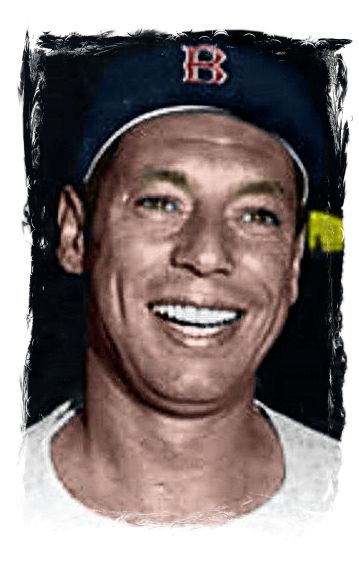 |
Born in New York City on October 11, 1926, Joe Ginsberg was adopted as an infant by Joe and Rose (Cohen) Ginsberg. His given name was Myron Nathan Ginsberg, but he was called "Little Joe". Besides playing baseball and basketball at Cooley High School, he played Legion baseball, and was signed the Detroit Tigers in 1944. Joe broke in with Jamestown (Pennsylvania) Falcons of the Class D Pennsylvania-Ontario-New York League. The Falcons finished in second place in the regular season, and won the league championship by winning all seven of their playoff games. Joe started six of the games, all in left field. By seasonís end he was listed as an outfielder and assigned to Buffalo for the 1945 season. Instead, he was drafted and wound up serving in the Army in the Philippines. He was not recruited to play baseball in the Army, but learned of the Manila Dodgers team from a buddy. He asked for a tryout and made the team, but did not play until regular catcher Joe Garagiola suffered a broken finger. Discharged from the Army, Joe began the 1947 season at Triple-A Buffalo, but was sent to Class A Williamsport and finished the season there. He hit only .220 and played 14 games in the outfield. In 1948 he returned to Williamsport and began the season on a high note, hitting safely in 13 of his first 15 games. His .326 batting average was just one point behind the league leader, and he was voted to the league All-Star team. At the end of the season Joe was called up to the Tigers and made his major-league debut in September, 1948, starting at home against Washington Senators. In 1949, Joe was sent to Toledo again and hit .336 in 63 games for the Mud Hens. He looked good during spring training in 1950 and was rewarded by getting the Opening Day assignment. Platooning with Aaron Robinson and Bob Swift, he caught 95 games (starting 81 of them) and batted .260 with eight home runs. After a second-place finish in 1951, the Tigers fell to fifth place. Aaron Robinson was cut loose in August, leaving Joe, and young Frank House still on the roster. With the possibility that House could be called up by the Army for the Korean War, the Tigers obtained catcher Matt Batts, in a six-player trade with the St. Louis Browns in February. In June, 1953, Joe was traded to the Cleveland Indians in an eight-player deal, in which the Tigers obtained two-time All-Star Ray Boone. Joe finished the season with a .290 batting average. In 1954, he played for the Indianapolis Indians, who had one of the finest minor-league teams of the decade. Hank Foiles was the everyday catcher, but shared playing time with Joe. He hit .291 in 59 games and the team finished first in the American Association by 10 1/2 games, but lost in the playoffs to Louisville. In 1955 there was a logjam at the catching position in Indianapolis, and Joe wound up in Seattle of the Pacific Coast League as the starting catcher. Seattle went on to win the league championship, and Joe was named the PCLís Player of the Year. In September, he was sold to the Kansas City Athletics. In 1956 he hit .246 as the backup, and in August he was traded to the Baltimore Orioles. In 1957, Joe and Gus Triandos were the only catchers, so he got more playing time and hit a respectable .274. But 1958 and 1959, his ninth and tenth seasons in the majors, were down years. So in 1960, he was released in June, and three days later, signed with the Chicago White Sox. He hit .253 in limited duty with the White Sox, played little at the start of 1961, and was released in May. Then Joe was signed by the Red Sox to back up Jim Pagliaroni and Russ Nixon. He got into only 19 games and hit .250 in 24-bats, with five runs batted in. After the season, he was released by the Red Sox, and in January, 1962 he signed with the Mets. Though Joe caught the Mets' home opener, he got into only one other game, and was released in May. In June he caught on with the Denver Bears and retired as a player after the season. After baseball he became a salesman for the Jack Danielís distillery, covering Michigan. He was an avid golfer and enjoyed participating in charity tournaments. He divided his time between Michigan and Florida and appeared at a few Tigers fantasy camps. Joe Ginsberg died on November 2, 2012, at Sunrise Retirement Living of alzheimer's disease, in West Bloomfield, Michigan, at age 86. |
|||||
